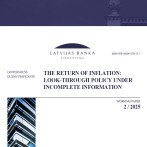Fuel prices and seasonal factors impede decrease of consumer prices
As in the other two Baltic countries, in Latvia too the rise in fuel prices in March had an important effect on the changes in the overall consumer price level. Any decrease in prices in March was impeded also by seasonal factors: the arrival of the new clothing and footwear collections, end of seasonal sales, and rise in the prices of seasonal vegetables and fruits. Consumer prices rose 0.5% over February.
After a rapid rise, the consumer price level reached its highest point exactly one year ago, in March. After that it has been dropping almost constantly, and in March of this year is 3.9% lower than a year ago. The previously rapidly rising prices for unregulated services have had most pronounced reaction to the drop in demand and costs of labour - in March they were 8.0% lower than a year ago. Prices have dropped in nearly all groups of unregulated services. Substantial drops have been observed in prices of insurance and tourism-related services; prices of food and hair dresser services as well as others have also decreased. The drop in unregulated services was somewhat impeded by rising prices of financial services and increasing university tuition.
The low level of demand has resulted in price drop for many kinds of goods as well. The prices of footwear and clothing have dropped an average 8.2% in one year. In view of the worldwide drops in the prices of food products, in Latvia too they have dropped an average 5.1% over a year, with a more pronounced drop in the prices of milk and grain products.
Under the influence of global trends, the prices of energy resources in Latvia have decreased substantially; e.g., the heating tariffs were 25.7% lower than at the end of the heating season last year. However, because of the long and cold winter, the drop in tariffs compared to the previous winter was scarcely felt.
Fuel prices in Latvia reacted to the global energy resource price dynamics with much less of a time lag than the administrated energy resource prices. The fuel prices have grown very rapidly - already 18.8% over a year -, decreasing the overall drop in the price level by 1.1 percentage point.
It is expected that as a result of the base effect (the comparison will be made with an ever lowel price level) the annual deflation will decrease. It does not mean however that the downward price adjustment has stopped - the weak domestic demand will continue to act to decrease prices this entire year and service prices will be particularly affected. Therefore the drop in the consumer price level is expected to be observed until the end of the year, but the prices will drop more slowly than predicted up to now. The rise in global energy prices will maintain the pressure on consumer price rises. Based on the tariffs published by the "Latvijas Gāze" company, the industrial consumers can expect a substantial rise in heating tariffs already in April, which may effect a rise in the overall price level in the next month.
Textual error
«… …»






